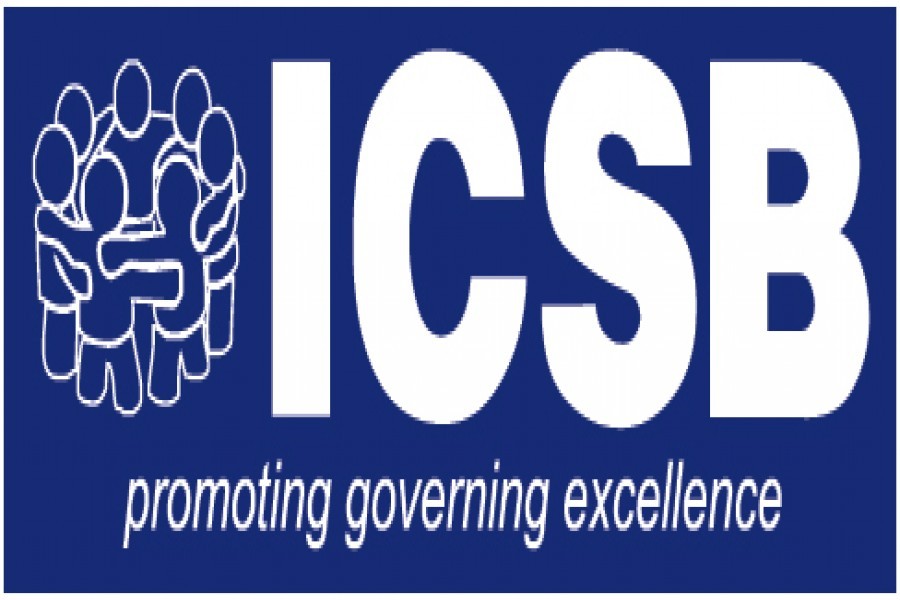The Institute of Chartered Secretaries of Bangladesh (ICSB) organized a Continuing Professional Development (CPD) programme on "Finance Act 2020 and Its Impact on the Business” on July 11 on virtual platform.
Barrister Nihad Kabir, President, Metropolitan Chamber of Commerce and Industry, Dhaka (MCCI) graced the occasion as the Chief Guest.
She said that COVID pandemic situation is going on and 35% value chain is interrupted.
"We do not know which shape of economic recovery will happen in our country. Now our concern is large unemployment, created due to COVID effect especially overseas workers are coming back, so we need a large SME portfolio," the MCCI chief said.
"We need to especially think about the budget deficit and inflation rate rather than GDP growth."
She emphasized on capacity building of NBR, research & study and impact assessment prior to any changes in the fiscal policy. She also mentioned that time has come to segregate policy formulation and revenue administration activity as there is a moral hazard and conflict of interest. She also discussed to increase the tax net rather than tax rate. She concluded by emphasizing the needs of proper and fundamental taxation regime in Bangladesh.
Mohammad Sanaullah FCS, immediate past president and Chairman, Professional Development Committee of ICSB, chaired the session.
Muzaffar Ahmed FCS, President of the Institute gave the welcome speech. Mohammad Iqbal Chowdhury FCS, Chief Financial Officer (CFO), Lafarge Holcim Bangladesh Limited presented the Keynote Paper on the subject. Kazi Ashiqur Rahman FCS, Senior Manager-Corporate Affairs, Singer Bangladesh Limited and Md. Kausar Alam FCCA, FCMA, FCS, Chief Financial Officer & Company Secretary, Seven Circle Bangladesh Limited were the discussants.
The keynote paper presenter Mohammad Iqbal Chowdhury FCS in his presentation clearly showed how back dated provisions of VAT Act 1991 are inserted in the VAT Act 2012 through the Finance Act 2020.
He mentioned that purpose of new VAT Act was to generalize the rules and laws in a more comprehensive and user-friendly manner, to make it easier to understand, simple and reliable for the end-users.
With changes in Finance Act 2020 the main spirit of VAT Act 2012 was distorted. He elaborately discussed the increase, reduction & extension of VAT, personal and corporate tax. He also mentioned that putting a limit of 0.5% (previously 1.25%) on turnover for all promotional expenses will be disastrous and to be obstruction to the business growth which will also lead to revenue loss to the NBR.
He also highlighted to enhance the tax net rather than the tax rate, avoid frequent changes in the policy and sustaining tax policy at least for 3-5 years to give visibility to investor, to conduct impact study before making any major change in the tax policy and to go for compliance campaign with the trade bodies.
In taking part discussion, Md. Kausar Alam opined that this finance act has a significant high expectation among stakeholders. VAT declaration, approval from authority, single VAT registration VAT online, online assess and so many revolutionary aspects were there in the law. But in some cases, the original act and reality are different such as narrowing down VAT rebate. Business community and professionals still hope business and revenue friendly automated online VAT system with e-payment and online assessment less manual interaction with VAT authority to improve overall VAT and SD environment. NBR, business leaders and professional bodies like ICSB should work in close harmony to get results.
In taking part discussion, Kazi Ashiqur Rahman FCS thanked keynote speaker for his detailed coverage in the presentation. He emphasized that companies’ business decisions are based on the tax situation that exists today. Therefore, it is extremely difficult to organize their activities today based on a future law that will be made applicable from today. Business community worried about the tradeoff the retrospective tax effects. Changes in fiscal policy with retrospective effect distorts not only the whole tax planning of the companies but also leads to understated or overstated profit. He stated that unpredictability in the fiscal policy not only discourage the existing investors but that also restrict prospective investors. He highlighted that tax payers mostly want stable fiscal policy rather than tax rate benefits.
Mohammad Sanaullah, Session Chairman summed up the program. In his remarks, he mentioned that we have to live in the tax regime. Every year budget will come and there remains previous taxes and additional taxes as well. He mentioned that economy mostly depends on the contribution of private sector but private sectors employees long term benefit like PF and gratuity are not allowed to be invested in pension scheme. This needs to be addressed. He has also given more emphasis on tax planning which works on the predictable tax regime not in the unstable situation. He highlighted the reduction of admissibility of promotional expenses which will ultimately lead to negative impact on business like profitability, employment and revenue generation as well. Raising the deposit of tax prior to appeal from 10% to 20% will also discourage the honest tax payers. He also highlighted the participants voice at the CPD in favour of the restructuring of revenue administration for bringing more accountability. For that purpose digitalization of taxation system is much demanding issue of the tax payers.
-rmc/


